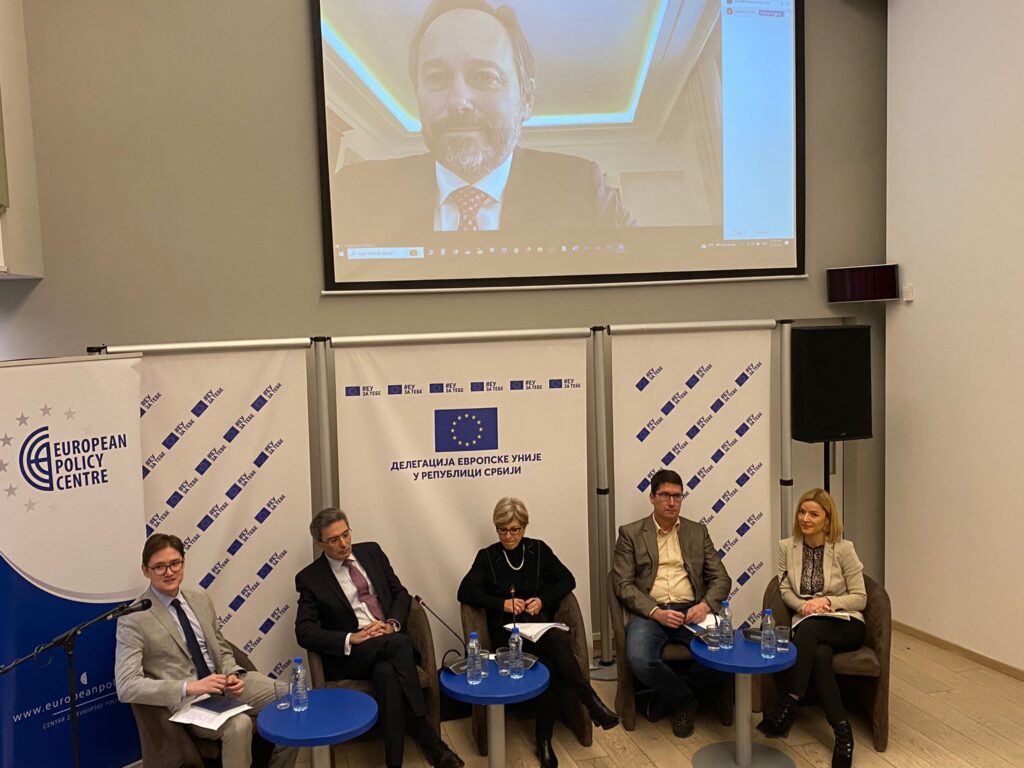Headquarters: Svetog Nauma 7, 11000
Office address: Đorđa Vajferta 13, 11000
Phone:: +381 11 4529 323

15 December 2023 – In the premises of the EU Info Centre in Belgrade, a panel discussion, From Spain to Belgium: Presidency Returning to the Heart of the EU, was organised, by the EU Delegation to Serbia and the European Policy Centre (CEP). The panellists at the event were H.E. Cathy Buggenhout, Ambassador of the Kingdom of Belgium, , H.E. Raul Bartolome Molina, Ambassador of the Kingdom of Spain, H.E. Emanuele Giaufret, Ambassador and Head of Delegation of EU to Serbia, , Vladimir Ateljević, Advisor to the Minister for EU integration and Milena Mihajlović, Programme Director at CEP. The panel was moderated by Strahinja Subotić, Programme Manager and Senior Researcher at CEP.

The Spanish Presidency, from which there were great expectations and that began in complicated circumstances, ends on 31 December this year.
“The Spanish Presidency took place in a very complicated situation at home, due to elections and the formation of the government. Enlargement is, nevertheless, kept at the top of the European agenda. Even though we don’t yet have the conclusions of EUCO because themeeting is still in progressat this moment, we know that negotiations with Ukraine and Moldova will be opened. We are satisfied with what we have done this semester as a country presiding over the Council “, Bartolome Molina said.
Giaufret pointed out that EUCO has now decided to address the issue of reforms, and there are very concrete steps that will keep EU busy in next six months regarding the enlargement process. He also said that the Growth Plan for the Western Balkans is an attempt to revive the accession process in the region.
“Growth plan is not a substitution for the enlargement, but attempt to give the process a new life and to facilitate WB’s accession to the EU. The key issue here is that there is a window of opportunity for WB that needs to be seized.”
Ambassador Giaufret continued his address by explaining the key elements of the growth plan for the Western Balkans.
“Growth plan is divided into four pillars: integration of the Western Balkans in the Single Market, economic integration, reforms and funding element (additional financial support).”
Buggenhout announced what awaits the Union during the Belgian presidency and how they’ll deal with the inherited challenges.
“As founders of the EU, we want a functioning Union in the future. At the moment, there are 150 legislative proposals on the table awaiting trialogue, which the Belgian presidency will try to facilitate during its term. Also, we need to strengthen our defence capacities to improve our resilience. “
The Ambassador of Belgium also presented four topics to mark the Belgian presidency.
“Our presidency agenda articulates four key themes: protect our citizens, strengthen our cooperation (reform internal market), improve defence capacities and resilience, and prepare EU for the shared future.”
Ateljević explained that Serbia’s next steps are to speed up its path to the EU and what it would be good for Serbia to focus on the further accession negotiations.
“Any acceleration of the enlargement agenda is a success for us. We should not give great importance to the money stemming from the Growth Plan, but focus on reforms – they have greater potential than the money itself. Serbia needs to grow 5% more over the next 20 – 25 years than the EU average to converge with the rest of the EU. “
Mihajlović referred to the Model for Staged Accession and the tangible benefits citizens can see if the reforms are properly and timely implemented.
“We had a momentum in 2019 when we had a proactive enlargement agenda. Now, we have a new impetus for the enlargement process with much more credibility. CEP has been very proactive on the debate on gradual/staged integration that would unlock opportunities for gradual market integration with progress on acquis alignment.”
In the second round of talks, the panellists have their final considerations and expectations for the course the EU will take in the next six months.
“It is very clear that all 27 member states stand behind the enlargement, and it is now upon Belgium to work on it in the upcoming six months. Gradual integration was first announced in EUCO conclusions in June 2022. Now it is time to make it operational,” said Buggenhout.
Ateljević concluded that it is extremely important for Serbia to become part of the single market to connect with other countries in the region and at the same time EU member states. Serbia needs to be ready for enlargement when the EU is ready.
In the end, Mihajlović said that the membership perspective is “on the horizon”. Many political actors, not only here in Serbia, were not in line with the EU accession because they were weighing their options. That is why the 2030 target would be a very important signal to the region, Mihajlović emphasised.
This event is part of a traditional practice that CEP and the EU Info Centre started seven years ago, intending to start a quality debate on EU priorities from the point of view of the countries presiding over the Council of the EU (outgoing and upcoming presiding countries), concerning current topics in the accession process. Serbia EU. The twice-yearly event gathers representatives of the diplomatic corps, state institutions, and civil society organisations and is widely covered by the media.